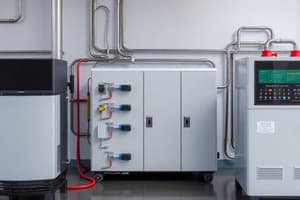Podcast
Questions and Answers
What storage method of hydrogen involves holding hydrogen on the surface of solids?
What storage method of hydrogen involves holding hydrogen on the surface of solids?
- Evaporation
- Absorption
- Adsorption (correct)
- Condensation
What is the boiling point of hydrogen at one atmosphere pressure?
What is the boiling point of hydrogen at one atmosphere pressure?
- 0°C
- −273.15°C
- −252.8°C (correct)
- −200°C
Which of the following is a factor influencing hydrogen's economic viability as a fuel?
Which of the following is a factor influencing hydrogen's economic viability as a fuel?
- Fuel cell efficiency
- Storage costs
- Transportation infrastructure
- All of the above (correct)
What hydrogen production method utilizes electricity to separate water into hydrogen and oxygen?
What hydrogen production method utilizes electricity to separate water into hydrogen and oxygen?
In terms of environmental benefits, hydrogen fuel can reduce which of the following?
In terms of environmental benefits, hydrogen fuel can reduce which of the following?
How does the cost of hydrogen fuel compare to gasoline, often resulting in higher expenses?
How does the cost of hydrogen fuel compare to gasoline, often resulting in higher expenses?
Which factor is not a market leader characteristic of the hydrogen industry?
Which factor is not a market leader characteristic of the hydrogen industry?
What is the cost range for hydrogen fuel per kilogram as mentioned in the example?
What is the cost range for hydrogen fuel per kilogram as mentioned in the example?
How does the cost of hydrogen for a Toyota Mirai compare to gasoline costs for a sedan, based on the given example?
How does the cost of hydrogen for a Toyota Mirai compare to gasoline costs for a sedan, based on the given example?
What is the driving range of the Toyota Mirai as stated in the example?
What is the driving range of the Toyota Mirai as stated in the example?
Which of the following is NOT a benefit of hydrogen fuels over gasoline?
Which of the following is NOT a benefit of hydrogen fuels over gasoline?
Who is currently recognized as a leader in the hydrogen industry in Canada?
Who is currently recognized as a leader in the hydrogen industry in Canada?
Which color code represents hydrogen production methods based on fossil fuels without carbon capturing?
Which color code represents hydrogen production methods based on fossil fuels without carbon capturing?
Which hydrogen production method has the highest CO2 emissions according to the life cycle assessment?
Which hydrogen production method has the highest CO2 emissions according to the life cycle assessment?
What is one of the main environmental benefits of using hydrogen fuels?
What is one of the main environmental benefits of using hydrogen fuels?
Which method of hydrogen production is derived from renewable resources?
Which method of hydrogen production is derived from renewable resources?
Which fossil fuel-based hydrogen production method is associated with carbon capture?
Which fossil fuel-based hydrogen production method is associated with carbon capture?
Comparatively, how do hydrogen fuel costs generally align with gasoline costs?
Comparatively, how do hydrogen fuel costs generally align with gasoline costs?
Who are potential market leaders in the hydrogen industry?
Who are potential market leaders in the hydrogen industry?
What respiratory issue can be exacerbated by air pollution stemming from traditional fuel sources?
What respiratory issue can be exacerbated by air pollution stemming from traditional fuel sources?
What type of hydrogen production uses heat from nuclear reactions?
What type of hydrogen production uses heat from nuclear reactions?
Which hydrogen production method is not typically considered environmentally friendly?
Which hydrogen production method is not typically considered environmentally friendly?
Flashcards
Hydrogen Storage Temperatures
Hydrogen Storage Temperatures
Storing hydrogen as a liquid requires extremely low temperatures (cryogenic) due to its low boiling point.
Hydrogen Storage Methods
Hydrogen Storage Methods
Hydrogen can be stored on solid surfaces (adsorption) or within solids (absorption).
Hydrogen Tank Types
Hydrogen Tank Types
Hydrogen storage tanks come in various designs, each suitable for different applications.
Hydrogen Production Rate
Hydrogen Production Rate
Signup and view all the flashcards
Hydrogen Storage Pressure
Hydrogen Storage Pressure
Signup and view all the flashcards
Hydrogen Production Capacity (e.g.,Oshawa)
Hydrogen Production Capacity (e.g.,Oshawa)
Signup and view all the flashcards
Electrolyzer Capacity
Electrolyzer Capacity
Signup and view all the flashcards
Hydrogen Fuel Cost
Hydrogen Fuel Cost
Signup and view all the flashcards
Hydrogen Vehicle Driving Range
Hydrogen Vehicle Driving Range
Signup and view all the flashcards
Hydrogen Storage
Hydrogen Storage
Signup and view all the flashcards
Hydrogen Production
Hydrogen Production
Signup and view all the flashcards
Carbon-Hydrogen Ratio
Carbon-Hydrogen Ratio
Signup and view all the flashcards
Hydrogen Age
Hydrogen Age
Signup and view all the flashcards
Why Hydrogen?
Why Hydrogen?
Signup and view all the flashcards
Electrolyzers
Electrolyzers
Signup and view all the flashcards
Fuel Cells
Fuel Cells
Signup and view all the flashcards
Hydrogen Hubs
Hydrogen Hubs
Signup and view all the flashcards
LCA of Hydrogen Production
LCA of Hydrogen Production
Signup and view all the flashcards
Fossil Fuel Based Hydrogen
Fossil Fuel Based Hydrogen
Signup and view all the flashcards
Renewable-Based Hydrogen
Renewable-Based Hydrogen
Signup and view all the flashcards
Hydrogen's Role in Climate Change
Hydrogen's Role in Climate Change
Signup and view all the flashcards
Study Notes
Hydrogen Energy Systems
- OntarioTech University Faculty of Engineering and Applied Science, MECE3260U - Introduction to Energy Systems course
- Course topic is Hydrogen Energy Systems, delivered by Dr. Ibrahim Dincer, Professor of Mechanical Engineering.
Outline
- Introduction
- Why Hydrogen?
- Hydrogen Production
- Hydrogen Production methods include Electrolyzers
- Hydrogen Storage
- Fuel Cells
- Hydrogen Hubs
- Closing Remarks
Nuclear Fusion
- The sun uses nuclear fusion to create energy.
- Hydrogen atoms are heated to form plasma.
- Protons in the nuclei fuse to create helium atoms and neutrons, releasing energy.
Canada's Hydrogen Strategy
- Canada aims to produce and use hydrogen by 2050.
- Strategies include network expansion, pipeline development, and creation of new industries for hydrogen use.
- Part of Canada's integrated energy system, incorporating renewable energy sources like wind and solar.
- Canada is among the lowest-cost producers of carbon-free hydrogen globally.
World's Largest PEM Electrolyzer
- Air Liquide completed the construction of the world's largest PEM electrolyzer in Bécancour, Québec.
- The electrolyzer produces low-carbon hydrogen using renewable energy.
- Its capacity increases Bécancour hydrogen production complex by 50%.
Hydrogen Production Methods Classification
- Categorized by energy source (renewables, nuclear, fossil fuels).
- Sub-categories distinguish between those processes that capture carbon and those that do not.
- Coal, oil, and natural gas all have a high carbon footprint in production.
- Nuclear, wind, solar, biomass, geothermal produce hydrogen with very low carbon footprint
LCA of Hydrogen Production Methods
- Carbon dioxide (CO₂) emissions in hydrogen production from various energy sources (coal, oil, natural gas, nuclear, solar thermal, PV, wind hydro, large hydro, biomass).
- Different production methods have vastly different CO2 emissions
Hydrogen 1.0: A New Age
- The evolving nature of society, moving from Industry 4.0 towards the next stage (Society 5.0).
- The integration of hydrogen energy technologies in developing a new sustainable society.
- Discussion of different types of societies, from hunting-gathering to Agrarian, then to Industrial and now moving towards Information Societies and the transition to Hydrogen.
Water Electrolysis for Hydrogen Production
- Electricity is used to separate water into hydrogen and oxygen.
- An electrolyzer is the device that splits water.
- The process involves an anode, cathode, and an electrolyte (with a membrane).
Specifications of Electrolysers
- Different types of electrolyzers (Alkaline, PEM, SOE, AEM) have different characteristics.
- Electrolyzers differ in terms of electrolyte type, operating temperature, pressure, stack lifetime, technology maturity.
- Cost of the electrolyzers varies significantly from one type to another.
Textile Wastewater Treatment
- Industrial processes use wastewater to produce hydrogen.
- Various stages, including coagulation, flocculation, sedimentation, membrane filtration, and Reverse Osmosis, treat the wastewater.
- Captured CO2, and other byproducts.
- Production of hydrogen using wastewater and other byproducts is a useful use-case to reduce the environmental impact of industrial processes, and also produce useful fuels.
Fuel Cells
- Hydrogen and oxygen react to generate electricity and water in a fuel cell.
- The fuel cell system consists of a hydrogen and oxygen source, electrolyzers, a membrane separating anode and cathode, and components for electric power generation.
Electric Current Generation by Fuel Cell
- Hydrogen and oxygen reactions in a fuel cell produce electricity, while water and some heat is released as byproducts.
Fuel Cell Types
- PEMFC (Proton Exchange Membrane Fuel Cell) is a type of fuel cell.
- PEMFC advantages and disadvantages: fast, compact, no corrosive liquids, but needs expensive catalysts.
- PEMFC reactions (anode and cathode reactions, overall reaction).
Typical of Fuel Cell Technologies
- Comparison of different fuel cell types (e.g. PEM, Alkaline, Phosphoric Acid, Molten Carbonate, Solid Oxide).
- The different fuel types, the operating temperature range, stack size, electrical efficiency, and applications of these fuel cell types are all listed.
Industrial Hydrogen Tank Types
- Various types of hydrogen tanks (Type 1 – All Metal, Type 2 - Metal liner with composite structural hoops, Type 3 – Metal liner with full composite wrap, Type 4 - Full composite wrap with plastic liner) are used for different applications.
- Safety features, material properties are crucial for tank design.
Hydrogen Storage Options
- Methods for storing hydrogen (compressed gas, liquid hydrogen, adsorbed hydrogen, interstitial hydrides, complex hydrides, and chemical hydrides).
- The best way to store hydrogen depends on what the application is.
Hydrogen Hub in Oshawa, ON
- A proposed hub facilitating hydrogen production, storage, distribution, and utilization in the Oshawa region.
- The hub involves integration of different sectors (academia, industry, policies, and government) to effectively integrate renewable hydrogen into the economy.
Challenges, Opportunities, and Future Directions in Hydrogen Sector Development
- This section covers different challenges that need to be addressed for hydrogen development, such as storage, production, distribution, and utilization sectors.
- The study covers topics such as policy, education, economic incentives, and technological innovation.
World Hydrogen Production
- The production and supply of hydrogen from diverse sources in recent 2022, 2023, and other years.
- The role of electrolysis, coal, natural gas, and crude oil in hydrogen production.
Studying That Suits You
Use AI to generate personalized quizzes and flashcards to suit your learning preferences.



